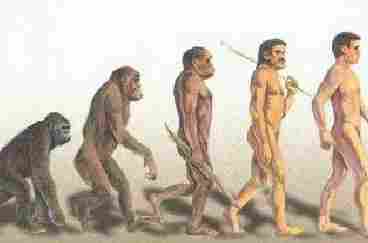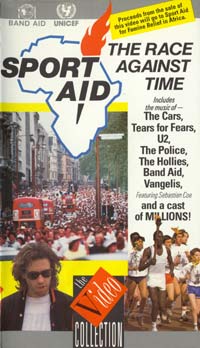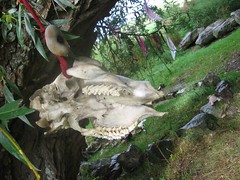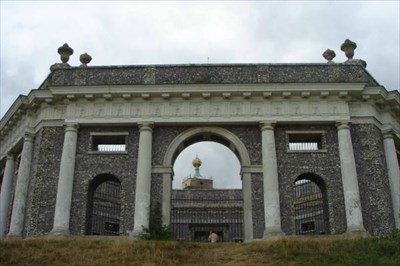Replete with alcoholic beverage, the quartet headed West, drunkenly jaywalking the Bow Flyover while on their merry way to the nearest Underground Station at Bow Road. The West End, when they reached it, continued to be as busy as always, and the visitors spent money in various Soho amusement arcades until the early hours of Sunday morning. Eventually tiring of dispensing good money into fruit machines, they departed for Green Park. A unanimous decision had already been reached (halfway across the flyover) to use the Park as a dosshouse. 'Borrowing ' some deckchairs from a closed hiring point, they settled themselves in a dark spot below some low hanging trees and listened to the relaxing rhythm of the perpetual traffic on Piccadilly.
Jason, feeling the tension of the day disperse, clasped his hands behind his head, fidgeted himself into a comfortable position in his deckchair, and turned his head to gaze at Lea [recently returned from the States after working at a Summer Camp].
"So, Lea, what was it you got chucked out of America for?"
Lea groaned and buried his head in his hands. "I didn't get chucked out," he mumbled through his fingers.
"Oh no, that's right," Jason continued smoothly, "You left of your own free will. Why was that, exactly?"
"You were never clear about that business," Kevin chimed in accusingly, enjoying Lea's discomfort, "Come on, Lea, tell us. There're no secrets among mates, surely?"
Lea raised his face and sighed in resignation. "Okay... if you must know... I belted a kid."
"Lea!" Mark frowned in mock reproach, "Child abuse is a very serious offence, you know"
"It wasn't child abuse," Steve snapped, "The little fucker pulled a butterfly knife on me. I was well within my rights to give him a slap."
"Pity your bosses didn't see it that way," Jason drawled, keeping up the castigation.
"Look, the day it happens to you is the day you can mock," Lea warned, "What would you have done, eh? In all seriousness?"
"A kid, eh?" Mark murmured, "You could have offered him a sweetie if he'd put the blade away."
"A sweet!" Lea snorted, "The only candy these little toerags were into was nose candy."
"So if he brandished a knife at you, how come you carried the can?" queried the curious Kevin.
"Apparently I was supposed to just walk away, instead of which I gave the little oik a good clout. The camp got terrified of possible litigation."
"Another career bites the dust," Jason commented.
Lea shook his head with amusement. "It was just a Summer job, never a career. I only did it for the chance to see America. Now I'm back, I suppose I'll go back to my old lifeguard job."
They fell quiet for a moment, their musings underlined by the distant traffic.
"What time is it?" Mark asked presently.
Kevin checked his watch. "Two."
"I'm not in the least bit tired," Lea complained.
Jason stared in agreement. "Neither am I."
"So what can we do to pass the time?" Kevin asked, "I mean, we've decided to spend the night in Green Park, but it's not exactly crawling with nightlife, is it?"
"We could go for a walk across the road, check out Hyde Park," Mark suggested.
"Don't know if I can be bothered," Jason grumbled.
"Fine by me," Lea claimed, rising from his deckchair and stretching his arms, "There's nothing to stop you from staying here and chatting to any drunks or junkies that stroll through the Park. Who's coming?"
Kevin and Mark signalled their willingness by standing from their deckchairs. Jason swore quietly to himself. As much as he wished to stay here and doss in his deckchair, he had no desire to remain in the unfamiliar environs of the Park by himself. With an expression of saturnine reluctance, he assumed a vertical position and snapped, "Come on then, lead the way."
They stumbled across Green Park and departed through a gate in the north-western corner. Before them lay the great junction of Piccadilly, Park Lane, Constitution Hill and Grosvenor Place: the junction known as Hyde Park Corner. In the centre of this space stood a large bronze statue of the Duke of Wellington, sitting astride a regal stallion.
"Surely it would have been more appropriate for a statue of the Iron Duke to actually have been cast in iron?" Mark noted, raising a quizzical eyebrow.
"Yeah, but by now we'd be calling him the Rusty Duke," Jason grinned.
As he and his friends gazed at the impressive sculpture, Mark thought of an excellent way to pull a fast one on... Lea. Yes, Lea was the only one likely to fall for this particular prank. Grinning mischieviously, Mark bounded up the statue's plinth and began a clambering ascent. Just as predicted, Lea - never one to shy away from proving who was the best climber of the bunch - also sprang forward and commenced to scramble with considerable alacrity up the bronze titan, sweeping rapidly past the more sluggish Mark. He scaled a large portion of the Duke before glancing earthwards... and noticing that his companions had all absconded. Lea cursed and wildly checked his surroundings - and there they were, sprinting across the road, on a direct course for Hyde Park. Lea cursed again, feeling immensely foolish at succumbing so easily to one of Mark's silly pranks, and descended the incongruous bronze with as much haste as personal safety would allow. The instant he felt solid ground beneath his feet Lea began to run, aware that his friends had already vanished into the black sanctuary of Hyde Park. He fearlessly pounded the ground in their wake, plunging unhesitatingly into the forbidding gloom, losing their trail completely.
Several minutes elapsed, during which the Park remained peaceful and the circulating traffic continued its eternal droning. The three tricksters then reappeared at their original point of entry into the Park. After a quick visual scan of their environment, they crossed the Corner, returned to Green Park, sank back into their deckchairs and confidently assumed that Lea would soon come scampering back with his abashed tail between his legs.
They waited fruitlessly for quite some time, tiredness gradually permeating through and numbing their faculties. Restless slumber approached. Mark's chin dropped to his chest and his eyelids drooped... then an instinct deep within clamoured for his attention. His eyes sprang open and his head lifted.
One of the concrete lanes that meandered across Green Park passed within ten metres of the leafy nook where the young men dozed. Approaching along this lane, still some fifty metres away, was a large luminous spectre. Mark blinked clarity into his squint. The phantom prowler solidified into a white motor vehicle.
A police van.
The vision automatically resurrected the recent and frantic memory of Pimlico. "Pigs!" cried Mark, leaping to his feet. With typical curses, Jason and Kevin sprang upright. In a fraction of a moment, they assessed the situation - police coming! - and, without even bothering to reach a verbal agreement, accompanied Mark as he started to make rapid southward progress.
A flashlight, mounted on the roof of the van, seared its brilliant beam through the trees. White light played across the abandoned deckchairs. The van then accelerated, swung right and sped along a perpendicular lane... the lane toward which the teenagers, sprinting through trees, were now heading.
Kevin, with Mark and Jason close alongside, saw the lane looming ahead. He glanced left, took in the approach of the two dazzling headlights and realised in a flash of perspicacity that the van and themselves had inadvertently plotted an intercepting course. As the scything glare brought artificial daylight to the entire area, Mark and Jason reached the same conclusion as their companion. The trio slowed to a halt by the side of the lane.
The van decelerated to a crawl as it reached them. The copper in the driving seat shone a handtorch across their faces, picking up the blank expressions of the three young men who watched him from merely feet away. Jason braced himself for another round of belligerent accusations. Instead, the copper disinterestedly withdrew the torch and the van sped away.
The teens stared at each other in thorough confusion. "What the hell..." began Jason.
"He didn't even ask us what we were doing, running around at three in the morning," Mark stated in disbelief.
Kevin's visage, normally impassive, displayed profound relief. "Let's just be thankful. Maybe they got a call ordering them somewhere else." As mystified as the next man, he stared at the receding vehicle. "Come on lads, I reckon we should go. I don't really fancy staying here if the filth are gonna be lurking around."
"Let's take a slow walk to Liverpool Street," Jason suggested, his mind still reeling from that somewhat surreal encounter, "By the time we get there, the trains might've started running."
Mark and Kevin nodded in vigorous compliance, and shortly afterward the trio left Green Park and undertook the laborious walk through the garish neon of the West and the concrete solemnity of the City. Regarding Lea, they felt concern... but not so much concern that any of them wanted to hang back and wait for him.
Meanwhile, during the course of his aimless lurking around Hyde Park, Lea experienced problems of his own. On a dim and lonely path, two concerned gentlemen had approached him and asked if he were okay. Lea distrusted them at once. Although not a bigot, he was not in a habit of consorting with homosexuals and these two were clearly of that persuasion. If he replied in the negative, they would take him as a runaway and invite him home. Lea had heard about the predators that lurked in the darkness of the city's green spaces at night. He replied, politely but firmly, in the positive and then tactfully cleared off. He left the Park, crossed Hyde Park Corner and returned to Green Park, uncomfortably aware that his acquaintances followed at a distance not quite discreet enough to be unnoticeable. His friends were no longer occupying the deckchairs, so Lea used the cover of the trees to give his followers the slip, then returned to Hyde Park. He accepted that he would be spending the rest of the night here alone, and found the concept thoroughly annoying. Bloody Mark!
While meandering through the Park in search of a shady spot, free from staggering junkies or creeping homosexuals, Lea fortuitously located a bandstand. The charity event 'Sport Aid' was due to commence in Hyde Park later that same morning, and the bandstand had been literally plastered with wooden boards emblazoned with the event's logo. Lea decided that one of these boards would make an excellent souvenir of his night up West.
As dawn broke across the slumbering city, Mark, Jason and Kevin arrived at Liverpool Street Station and instantly suffered a glitch in their proposed homeward journey. The ticket inspector on the platform barrier was polite but insistent: no way were Mark and Jason getting on a train with yesterday's tickets.
"Looks like we'll have to fork out for new ones," Mark sighed.
Kevin smiled and produced his Season. "One of the advantages of working in London, suckers."
"Let's hurry," Jason urged, "The train leaves in a few minutes."
"I'll get us something to eat," Kevin informed his companions, and the group split up - Mark and Jason to the ticket office, Kevin to the station's burger bar.
With noisy haste, Mark and Jason purchased fresh tickets and hurried back to the concourse in time to see the train preparing to depart.
"Quick!" cried Jason.
"Where's Kevin?" panted Mark as they leaped onto the train. The railman on the platform blew his whistle, and the train began to rumble off.
Seconds too late, Kevin hared onto the platform, laden with paper bags. He staggered to a stand, staring at the departing train, then his eyes fell to the three take-away breakfasts that he had just purchased for his friends and himself.
"I'll pig out myself then," he declared defiantly.
A short distance to the west, an exhausted figure sat slumped on a seat in the rear carriage of a Tube train. His head rested back on the glass of the window, his mouth hung agape and issued gentle, rythmic snores. Resting askew on his lap, clutched firmly in his sleeping hands, lay a rectangular wooden sheet with the phrase 'Sport Aid' splashed across its face.
 Sarah Flower Adams 1805-1848
Sarah Flower Adams 1805-1848

















